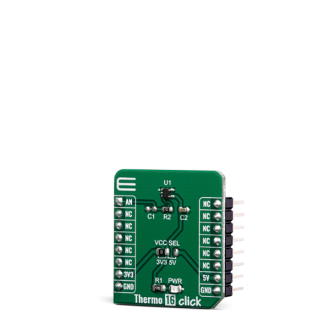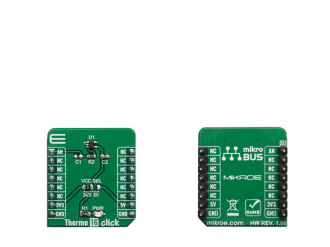
We strongly encourage users to use Package manager for sharing their code on Libstock website, because it boosts your efficiency and leaves the end user with no room for error. [more info]

Rating:
Author: MIKROE
Last Updated: 2019-07-25
Package Version: 1.0.0.0
mikroSDK Library: 1.0.0.0
Category: Temperature & humidity
Downloaded: 3867 times
Not followed.
License: MIT license
Thermo 16 Click is a Click board™ equipped with the sensor IC, which can measure temperature measurements between -40°C and +150°C so that the temperature measurement data can be processed by the host MCU.
Do you want to subscribe in order to receive notifications regarding "Thermo 16 click" changes.
Do you want to unsubscribe in order to stop receiving notifications regarding "Thermo 16 click" changes.
Do you want to report abuse regarding "Thermo 16 click".


Library Description
The library includes function for read Temperature data and function for system(board) configuration. The user also has the function for ADC init and read ADC data.
Key functions:
float thermo16_getTemperature(uint32_t adcValue, uint8_t tempIn) - Get Temperature data.void thermo16_systemConfig(T_THERMO16_SYS_CONFIG *config) - System (board) config.uint32_t thermo16_adcRead() - Get ADC data.Examples description
The application is composed of three sections :
void applicationTask()
{
uint32_t ADC_value;
float Temperature;
char demoText[ 50 ];
ADC_value = thermo16_adcRead();
Temperature = thermo16_getTemperature(ADC_value, _THERMO16_TEMP_IN_CELSIUS);
FloatToStr(Temperature, demoText);
mikrobus_logWrite(" Temperature: ", _LOG_TEXT);
mikrobus_logWrite(demoText, _LOG_LINE);
mikrobus_logWrite( " ------------------------ ", _LOG_LINE);
Delay_ms( 1500 );
}
The full application code, and ready to use projects can be found on our LibStock page.
Other mikroE Libraries used in the example:
Additional notes and informations
Depending on the development board you are using, you may need USB UART click, USB UART 2 click or RS232 click to connect to your PC, for development systems with no UART to USB interface available on the board. The terminal available in all MikroElektronika compilers, or any other terminal application of your choice, can be used to read the message.